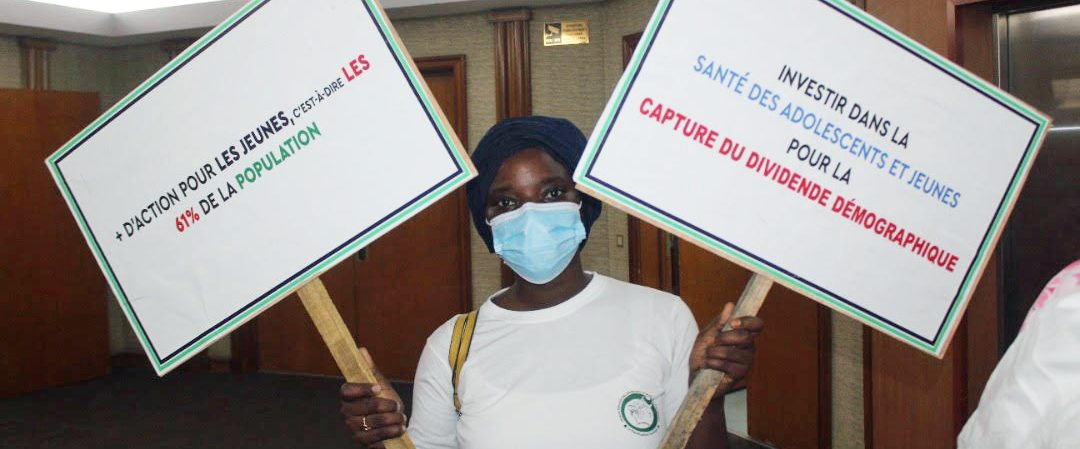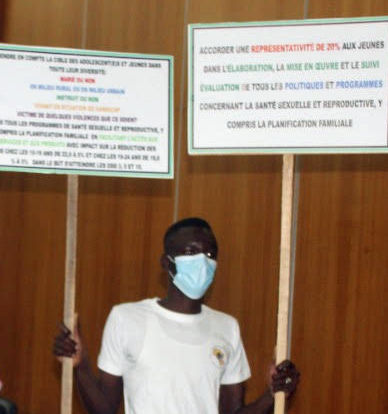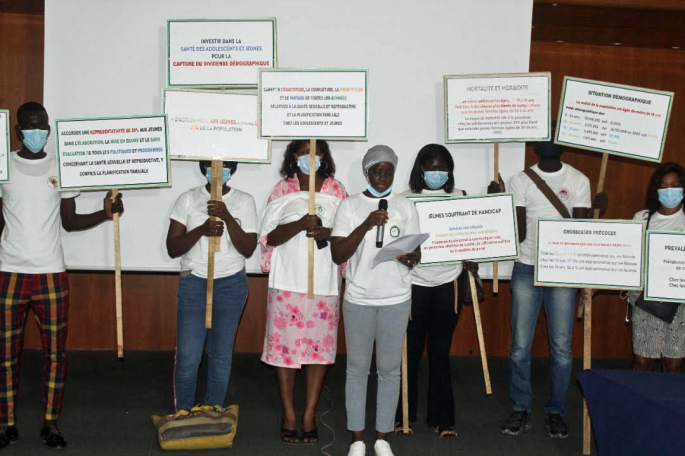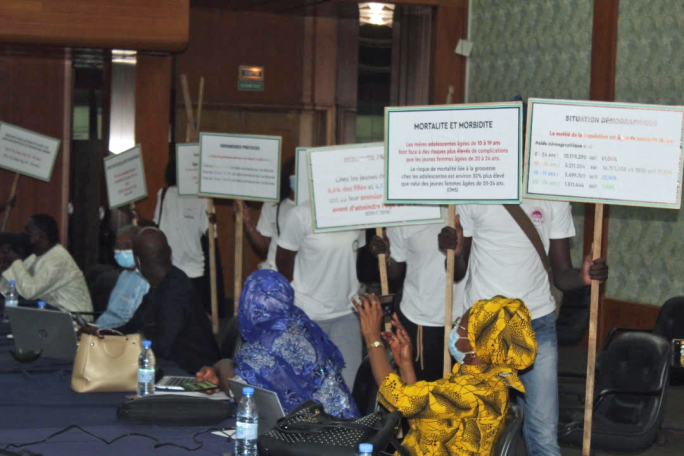

Claiming their Seat at the Table: Family Planning and Youth Leadership
Senegal
By Sara Gómez
In 2021 Fatou Diop was part of a process that forever changed the way youth participate in decision-making processes in Senegal – below she gives us a glimpse into the youth-organized protest that earned them their seats at the table. Fatou Diop, former youth focal point for FP2030, tells us the story.
When the Senegalese government began developing their commitment for FP2030, they invited only two youth leaders to take part in the process (out of a group of thirty). In a country where majority of the population is made up of young people (61% of the population is 24 years old or younger) this meager invitation to participate was unacceptable and a group of youth leaders representing ten youth-led organizations mobilized to make sure their voices were heard.
They went to the session and marched with placards, and afterwards there was a speech asking the State to make a certain number of commitments for adolescents and young people. At the end of this, the State invited young people to stay in the room and take part in the whole process of drawing up the commitments of the State of Senegal. In the end, we went from two participants to around ten. As a result, this time we have a commitment that the State has made to family planning, to improving the sexual and reproductive health of adolescents and young people. And that was a proposal. It’s a commitment that was proposed by the framework of young people…

It's something that was really very grandiose and that came as a shock to everyone … it's practically been the trigger that has meant that now young people in Senegal are invited to decision-making bodies because they know that if we don't invite young people, young people will be there anyway!
Fatou Diop
Advocacy and Youth Program Manager at Marie Stopes in Senegal, former youth focal point for FP2030
In the new FP plan, there will be many more activities and a much larger budget for the sexual and reproductive health of adolescents and young people…Because in the old plan, there was just one communication activity aimed at adolescents and young people. And for this new plan, with all the work we’ve had to do, there are a lot of activities, a lot more activities, notably activities linked to the service offer – so that the service offer is much more adapted to adolescents and young people. Demand creation activities, activities linked to the enabling environment – which are included in the document and have already been validated… there are many, many more activities for teenagers and young people. We’ve gone from maybe one communication activity to ten or so, in the new plan.
I think that now there are many more possibilities because people have understood. There are a lot of leaders, even religious leaders today, who support us. The state has also understood. And I think that’s why now, it’s much easier to propose activities and to see these activities accepted in the plan. I think they’ve also understood that young people are a real force to be reckoned with. Before, we used to think that young people were there just because they wanted to be there. But I think that now, young people have been able to show them that when they are there, they have that added value and their ideas have value.
And I think that’s why we now have much more of an opportunity to include our activities in this new plan. Before, people thought that young people only needed communication about family planning. So all the activities we had before were related to communication, awareness-raising and so on. But now, I think we’ve taken a step forward, because we’re making sure that the service offer itself is adapted to adolescents and young people. I think that’s important.


We’re making sure that service providers are much more open to receiving these adolescents and young people. We also make sure that we include activities that develop empathy among providers. We also make sure that we include activities that will enable providers to better understand the needs of adolescents and young people. That’s important too. I think that sexual and reproductive health education and access to services in schools is also something – we’re continuing to fight for this…because now there are a lot of young girls in school, and if we can give them direct access to this information, to services in schools, it could make things a lot easier for them. Yes, even continuing their studies.
I think the FP2030 partnership has helped us a lot – already in mobilizing resources – Also, the FP2030 partnership opened doors for us in that it was fairly easy for us to discuss with the other focal points, whether it be the FP2030 focal point of the government, the FP2030 focal point of civil society, we were able to have these connections and discuss with these commitments that we wanted to make. So I think the FP 2030 partnership has been a great support in helping young people achieve these commitments.
And yes, we’ve also worked hard on these commitments with the Ouagadougou partnership. they supported us a lot – throughout this process…The Ouagadougou partnership has been very supportive, even today, of young people’s participation in decision-making bodies in Senegal. Where policies are made and decisions taken, the Ouagadougou partnership has provided a great deal of support and advocacy so that we too can be present and make our voice heard in these bodies.
—-
We are the youth of today, we will be the adults of tomorrow. In 2030, when it comes to deconstructing commitments and developing new ones, it will be the young people in this room who will have to do so. So we feel it’s more than necessary to take an active part in this process today, so that the commitments that will be made fully reflect our needs.